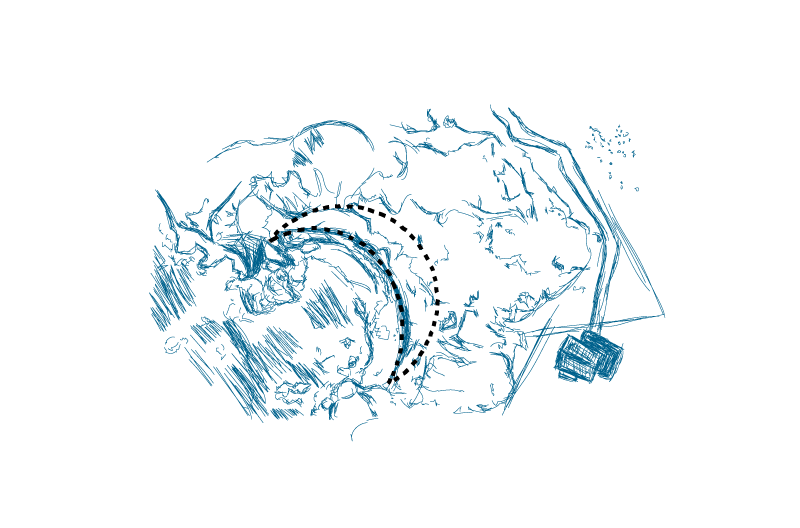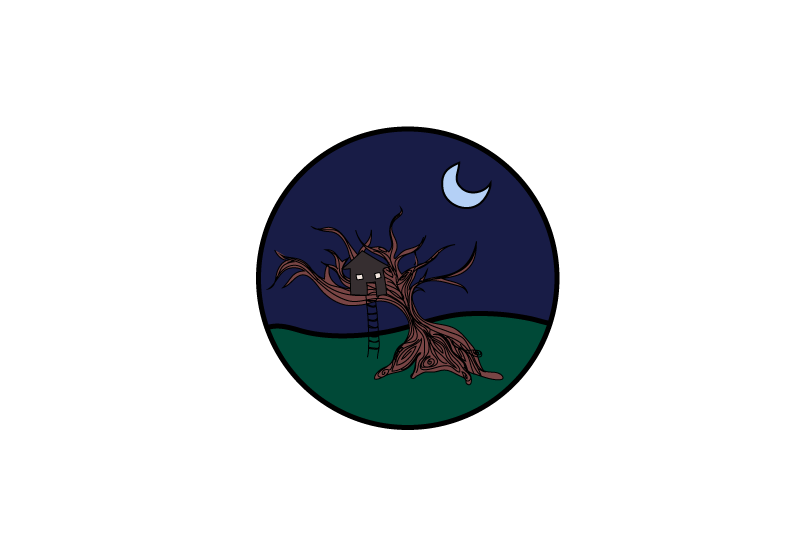Just don’t leave me alone
Wondering where you are
I am stronger than you give me
Credit for
– Mitski, “I Don’t Smoke”
Sometimes being a girl is like being possessed. I look back on us, on our childhood on the Coast, on running away, on returning, and I wonder: Did any of this really happen?
•
There’s a picture of us as kids. I used to have it in a frame, but somewhere along the way I started using it as a bookmark. I won’t think of the girls for months, and then I’ll pick up a book and the picture will fall out. There they are; how could I forget them? Rose, Audrey, Sam. I say their names aloud and it becomes a spell — like magic, I’m ten years old again.
The picture was taken on the side of the highway near the house where I grew up. We’re squinting at the camera; it was a grey day and the sky and the clouds and the road and the gravel shoulder of the highway all blended together brightly.
It was windy and our hair was lifting and tangling together: Sam’s face was partially covered by Audrey’s hair, Audrey’s hair was stuck to my lip gloss. I was smiling, closed mouth because it was the early stages of training our faces to look a certain way — pretty, unbothered, adult. No more sincerely toothy grins. We rinsed the candid part of us down the drain with our Sun-in and skimmed bottles of vodka; starvation and desire.
When you grow up in a small town, you sacrifice any and every part of yourself to make friends. Maybe that’s not unique to small towns — maybe that’s just childhood and a shorter span of world to explore. I was lucky. I met Audrey and Sam and Rose when I was nine years old, and we fit together perfectly.
I keep the picture around despite my habit of purging my old lives. I keep it around because these girls — Audrey, the leader; Sam, the beautiful; Rose, the tomboy — were my first loves. It feels wrong to simplify them like that, but this story isn’t about us separately. It’s about us together. It’s about us holding hands in the forest at night. It’s about 2,555 days of obsession. It’s about the number three. It’s about a question left hanging in the air. It’s about ghosts.
•
Ghost Girls in Three Parts
I came to live in the house near the ocean in Halfmoon Bay when I was nine years old. My parents built the house on 18 acres of forest that shouldered a protected bay that opened onto a forever of ocean. My grandpa bought the land in the 1950s as an investment that would eventually go to his children. I imagine him there, a man I didn’t know, surveying the land and the water from the rocky beach. Did he look out past the opening of the bay, out beyond to Mary Island where the lighthouse would one day flash through the night into my bedroom window? Did he bend and reach his hand down into the cold and clear water, brush his fingers across the rough shell of an oyster and think This could be something? He died long before we moved there, but there had to have been something of him there, in the pocket of light between dusk and evening. Is there really such thing as a house that isn’t haunted?
I used to think it was a town of its own — that the bay in front of the house was indeed the Halfmoon Bay. This was on account of the distance and solitude that surrounded the property and the house. It is silent and dark there at night; all you can hear are the waves. Years later, I still can’t sleep without complete darkness, I still wake up to any sounds in the night, real or imagined. At night, I’d sit with my leg hanging out of my third-floor bedroom window, waiting for something to happen. The ocean waves licked at the wound of the beach at night, and that place wasn’t just its own town, it was its own planet. It had its own atmosphere (heavy, silent), it’s own animals (invisible, they watched), its own timeframe (it moved slowly, like softened clay). Is it any surprise that at night, I felt watched?
•
Before the new house and before Rose and Sam and Audrey, we’d lived four towns over. Somewhere between the second and third grade my peers had discovered I was weird and I found myself suddenly friendless, a social pariah. I spent lunch hours at the back of the gravel field, hopping from rock to rock and counting down long seconds until the day was over.
If the soundtrack to those months wasn’t silence, it was my own heartbeat. Self-conscious of itself, it rattled against my chest and drew all of my attention away from the present moment. Maybe because of this, I’ve always considered childhood to be a daunting place. Even though there’s often some kind of guardian in your general vicinity, it doesn’t ease the loneliness or vulnerability or the fact that you’re in a different world, that that world is the size of a soccer field, and so when you don’t fit, there are few places for you to hide, and because you are still new to the universe people tend to assume you’re soft and bland and deaf to its injustices. But newness doesn’t negate cruelty, or desire, or the feeling of being overwhelmed by the growing sense that you aren’t in control, that when it comes down to it, it’s unlikely that anyone can hold your hand through anything.
And then we moved. And then came the girls.
•
The first was Sam. In late August, right before I was to start the fifth grade at a new school, I sat on the beach in front of our new house, and I waited for a wave to swallow me whole. In relation to the seclusion of my old school and the prospect of a new school, this seemed like the favorable option. The only problem was that the tide was low and the water unforgivably calm.
Two houses down, a woman picked her way carefully down the rocky beach. Her footsteps echoed off the cliffs, and her voice carried easily across the water. Sam, don’t go out too far, she called. I hadn’t noticed the girl swimming out in the bay until that moment. I won’t, Mom. Her voice rang like a bell.
There are moments like this in life, when the universe shifts slightly and life carries on, irreversibly changed. They pass without acknowledgment. It’s later that their spark becomes apparent. I sat on the beach and I watched Sam emerge from the water, beautiful and brilliant even from a distance, even at that age, and I prayed that she would choose me as her friend.
Or maybe it was a spell I cast, before I knew the potential of desires and repetition. Please god please god please god. A moment and a plea shift the course of a life.
•
Briefly, the girls:
Audrey, the leader. She was tall and slender and carried herself with confidence through puberty, long before the rest of us. She smelled of melon body spray and wore cappuccino lip gloss and was unafraid of boys or adults or unexplored regions. Her favorite color was pink, favorite animal cat, her dreams precise and ever-expanding. People listened to her talk and laugh easily, and she was pretty much a dream.
Sam — out of the water and sitting next to me on an old school bus, my prayer answered — the one beloved by all, in board shorts or corduroy pants, her beauty hanging over every room like a secret that was bound to come out. Her favorite color orange, favorite animal monkey, her ability to charm and love those around her undeniable from the start.
Rose, the tomboy, was short and swimming in oversized boys’ clothing. She had older brothers that had toughened her and taught her the language and nonchalance she needed to speak to the boys that I hadn’t yet figured out. I can’t remember her favorite color, or whether she was the type to declare one, but her memory was almost photographic, her tenderness masked in the toughness assigned to all tomboys.
What you should know: The other thing assigned to young girls is an assumed cruelty. Think of the term “mean girls.” Think of the term “bitch.” Think of the term “jealousy.” These things are hard to avoid.
What else you should know: Sam became ill in the sixth grade and started rapidly dropping weight. For so long, and in some ways, even still, the reason was a mystery.
They knew nothing of me and they were normal and lovely and so, by association, was I. I fell deeply and immediately in love.
•
Sometimes, being a girl is like being possessed. Sam and I were on an endless search for excitement in our quiet bay. We wore shortcuts through the forests around the bay and found empty lots to explore, half-built houses left quiet and unsupervised during the day, old houses down the block that sat silent, their curtains always drawn. We believed in all their horrible potential: This empty lot is where a serial killer lives, he stays in that little shelter back there, underneath the tree boughs, and he waits for kids to pass and then —
This house is only half-built because they started building it on top of the gravesite of a family that died here in a fire. The baby that died in the fire haunts the carpenters every time they try to hammer a nail, it just appears all wrapped in a white blanket and it starts crying, and you can hear it crying in the night and that’s how it gets people to come out into the forest to look for it and —
The curtains are always drawn because there’s a witch that lives inside and she’s been waiting for us for the past ten years and as soon as we knock on her door everything will —
Maybe our boredom and our youth made us stir crazy. Maybe it made us open to the magic and horror of everything around us. In any case, we found a Ouija board and candlelight and somewhere along the way, we began searching for ghosts.
•
The weekends of our childhood stretched on indefinitely, and we spent them trying to summon ghosts. Maybe it was because we were bored, maybe it was because all of our houses were hidden by forest at the end of curving driveways, maybe it was because our childhood happened before Facebook or Instagram and so we had enough privacy and darkness to believe in things we couldn’t see.
Audrey’s house was our favorite because it was the furthest from town, and it was big and old and her bedroom was at the top of three flights of stairs and she had older sisters and brothers and a room full of computers and couches where we could listen to Craig David at full volume on repeat — met this girl on Monday, took her for a drink on Tuesday, we were making love by Wednesday — while Sex Files or Red Shoe Diaries or whatever other late night pseudo-softcore show flashed in the background and we pretended not to be sparked by any suggestion of flesh or what people did to it. We spent hours under Audrey’s skylight discussing the merits of masturbation and we floated out into space and rotated earth together and our voices echoed against the lack of gravity. When you tell your parents you love them, do they always say it back? When you think about sex, do you ever say anything out loud? Is it worse to be the first or the last? Would you rather swim through a lake of blood, or spend a night with a dead body on top of you?
But it was her fort, the one her dad had built for her, that we truly loved. Her gravel driveway curved up from the road, and if you didn’t know where to look, you’d miss the footpath that veered off to the right and the two-floor wooden structure that it led to, barely visible through the trees. We had wild dreams for the fort — glass windows and carpeting and lace curtains and painted walls, a chandelier, a door with a lock — but it always remained unfinished. The windows remained pane-less and the one wall we’d managed to paint a light pink looked dirty in the dark light that filtered in through the tree canopy. Everything darker, quieter, dampened.
The fort had two floors and a ladder nailed to the wall. At night we’d walk together, hands over mouths to stop laughter from echoing into her mom’s bedroom, feet slow to go unnoticed on gravel. No one wanted to be the last up the ladder, so we’d scramble and pull ourselves up as fast as we could without spending too much time glancing around the shadowy corners of the bottom floor. If I was last, a splinter of hurt opened inside me and hardened into resentment at the possibility of being tossed aside. There we were, 12 years old, holding hands in the dark and unwittingly sharpening our weapons. Teach your girls to tie their shoes, love long division, speak firmly but sweetly, and compound their dissatisfaction with each other and the world until it can be used as a thick sheet of armor across their backs. In the safe haven of the fort we happily ignored the gravity of waltzing through these small resentments, these I’m fines, and instead learned to prize the relief of occasionally being the first, or the second, or the third to ascend.
We knew then, as most young girls know, the power of disregard and the power of three. Four girls, one thinking about being left at the bottom of the ladder, three clutching at the moment when it hadn’t been them, all unable to vocalize past the art of changing subjects and laughing it off. Better to carry the sliver of resentment than not be presented with the ladder to begin with.
The truth of it was that we had larger things at hand than our feelings. We had ghosts to call. We had death to disprove because that seemed easy — that was something big and overarching, that was a problem we could face together and say yes, there is a magical possibility here. There is this world, and there is something more. Our own worlds were each flawed in separate ways — divorce, absent fathers, some feeling of loss that crept around and settled under our left ribs, shoes that were too loud in the quiet hallways of a small town, period cramps, the unruly reality of our bodies, being first, being last — but those things could be ignored, those separate pains, in the name of our greater plan: to speak to the dead, to be fearless and disprove the dust of our small town.
On the top floor of Audrey’s fort, we lit three candles and sat in a circle and held hands. We repeated our requests for contact three times into the dark of the fort. If you’re here show us, if you’re here show us, if you’re here show us. Even at 12 years old, we pleaded into the night for a burden of proof.
•
Sometimes, we’d have a sleepover on the trampoline at my house. The trampoline sat on the upper lawn, at least 30 meters from the house and shouldering onto a steep hill of forest. We’d huddle in our sleeping bags and fall asleep under stars — the kind you can’t see from the city — and wake up all in the center of the sagging trampoline.
The other girls said that Sam and I talked in our sleep, keeping them awake, babbling in some made up dream language that came alive only at night.
•
Then there were the boys. Friday nights were butterflies and sweating palms and the single movie theatre in town that played the same out-of-fashion feature for weeks at a time so that occasionally we’d see the same thing twice. For each of us, there was a male counterpart wearing a Hawaiian-print shirt and gelling his hair in a basement bathroom and spraying on cheap body spray that came in a black plastic bottle. For all their unassuming awkwardness, I couldn’t take a boy looking at me. It made me want to cry. We’d go to the movies and I’d wait for the lights to go down and then I’d train my eyes on the screen and laugh when they laughed and notice every small movement out of the corner of my eye and wonder what tomorrow would be like at lunch hour, how things would have progressed, if my mother would see a change when she picked me up outside the theatre and drove the half hour back home along the quiet and dark highway. Inevitably, I’d move to a seat next to Audrey or Sam before the movie finished.
Once, one of the boys left a box of chocolates and a poem and hoop earrings on my desk in the morning before school and I buried them at the bottom of my bag and pretended that it’d never happened. Accepting this desire would mean a concrete signal that time was progressing on. The nights of our girlhood went on indefinitely — the burning excitement of someone who liked you sitting beside you in the dark, the sobering relief of the lights coming back on.
If a boy is made of gathered things, a girl is a planet losing mass and gaining moons. There the sun of our early desire, there the Saturn’s ring of our unafraid limbs. I lost them before I knew I had them. What do you call that passage of time when you learn to deny your own desire in order to lessen your vulnerability to loss? Girlhood, maybe.
•
We took turns hurting savagely over small wounds — for me, any expression of curiosity towards me became unbearable. Teach your girl to pinch her cheeks for color, to spot dust and decay more acutely than her male counterparts, to sharpen her ability to claim detachment in all situations by holding her breath indefinitely and focusing instead on the pinkness of her own cheeks.
We took turns hurting savagely, and in this way, we shared what we didn’t understand of the pain of embarking towards adulthood, towards an understanding of possession, of sex. Our obsession with what you couldn’t see bled into the realization of what it meant to be visible: that you could reach out for someone and they’d see you. That they could make the choice to turn away.
We lit three candles and we sat in a circle and held hands. We repeated our requests for contact three times into the dark of the fort. If you’re here give us proof, if you’re here give us proof, if you’re here give us proof.
•
Another game we used to play — rock, paper, scissors, but the amped-up version. Rock equaled a punch, paper a slap on the arm, scissors a pinch. I remember crying with laughter at that game, at the bruises on our arms. I don’t regret that approach, laughing with my girlfriends at the little bruises on our forearms, because perhaps this is always the case — we’re always a rock, a love note, a pair of sharp scissors away from some kind of impact. I am thankful for the small ways we prepared each other.
•
Through all this, Sam’s illness continues to ebb and flow. A tide of misery creeping in. A doctor looks closely at her fingers through a magnifying glass to see if she’s making herself sick. We laugh at the ridiculousness of it. We can’t believe she’d hurt herself like that. We try to hold her close. The doctors insert a feeding tube that snakes out through her nose. At school, kids ask her about it. Rose and Audrey and I rally around her and tell them that Sam is an alien and that the tube connects her to her home planet. They stop asking questions. At night, she receives meal replacements through it. We sleep on foamies in her living room and watch The Silence of the Lambs but turn it off because it’s not scary enough for us, all its subtleties lost on our preteen selves. In the morning, we wake up to the sickly sweet smell of vanilla that’s leaked out onto her pillow in the night.
•
Audrey and Sam had seen a ghost before. They knew that he was present because the temperature of the room dropped and he left messages written on the wall in jagged letters. His name, a question. It was an experience I envied constantly, the romance of shared experience. Whenever we tried to summon ghosts together, they brought up the ghost they’d seen, and the rest of us hushed and held our breath.
When we tried to summon ghosts together with our Ouija board or makeshift séances, I can’t remember if we asked for good spirits or for protection from the dark. When you’re waiting for a big thing to happen, sometimes the worst possibilities or nightmares seem better than nothing. I would have opened my eyes to anything for fear of being the only one to not see it.
•
Other nights, we snuck out of bedroom windows and walked down empty streets to the boys’ houses and knocked on their windows and waited for them to appear like ghosts behind plaid curtains. We placed our feet in the same footsteps on gravel driveways so that sleeping parents wouldn’t wake up until we were far enough away at the park down the street. There, the grass muffled our steps and no one in the world, living or dead, could hear us. At midnight, the sprinklers came on, and we shed our clothes and ran through the streams of water together until we were soaked and everything had shifted and I understood then as I understand now: Singularly, our desires are small flames, but together they could burn a town to the ground.
•
Audrey’s fort was a paradise of privacy. At my house, my parents never left me alone. By the time I hit 12, my sister was in university, and we lived far away from everything, so it seemed like no one ever had anywhere to go. In my entire childhood, I was alone at my house for only two hours a week: every Friday night when my parents went into town.
After their car tires could no longer be heard, I locked all the doors. Then I went upstairs and turned on all the lights in the house, then I went back downstairs and checked that everything was still locked. Then I turned on the TV and flipped through the channels. Then I went back upstairs and tried on outfits in front of my mirrored closet doors. I’d stare at myself and move closer and closer to the mirror, studying every angle of my face and body. When you stare at yourself like that, time gets messed up. Everything constricts and it becomes hard to look away. So the minutes would creep by and I’d put everything back in my drawers and then stare at my face that didn’t look like my own anymore. I’d go downstairs and the doors would still be locked and the lights on. All you could hear was the ocean. Then car tires on the driveway. Then the spell was broken.
Sometimes, at night, alone in a house, or in my apartment in the city, I fall into this trance. I can’t stop moving. I can’t close my eyes. I can’t lie down. There’s an anxious pain in my chest that culminates in moments of extreme stillness, a dip in heartbeat. I wonder where everyone is, I wonder how a night can feel so long. I look in the mirror and barely recognize myself. It’s as if I slip in and out of my body, the act of which emanates waves of electricity that surge through the floorboards of my house. Sometimes being a girl is like being possessed.
•
At the end of a gravel driveway in the forest on the water in the middle of the night, I sat on my windowsill and let my feet hang down on the roof and I waited for something big to happen and I tried to make sense of the face I’d been staring at for hours in the mirror and the equal parts excruciating anticipation and fear that I felt because I mostly wanted three things from life: love, in the romantic sense; to be taken seriously; to never feel scared.
•
The nights of our girlhood stretched on indefinitely. Under Audrey’s skylight, we asked every damn thing. For instance: For a period of 24 hours, would you rather be invisible or be wanted by everyone? The conditions are: If you are invisible you can sneak into mansions and use the neighbor’s swimming pool and listen in on people’s conversations about you and no one can touch you. The downsides are: you won’t feel temperature or water against your skin, you’ll have no use for clothing or material things, you’ll hear other’s conversations about you and no one can touch you.
The conditions of being wanted are: everyone you meet will love you fiercely without restriction, you’ll be showered with gifts, and people will mistake your body for a newly found wonder-of-the-world. The downsides are: you’ll become confused about the validity of love, you’ll lose most of the sensation of excitement, and people will mistake your body for a newly found wonder-of-the-world.
•
Sometimes we tried to stay awake until the sun rose. This was before any of us drank or took any kind of substance that would keep us awake. We relied on the sound of each other’s voices to pull us away from sleep. We made plans to walk to the beach and watch the sunrise. We made plans to swim in the ocean at night. We waited out the long hours of night. For seven years, we were enveloped in the electricity of each other.
•
It was Audrey who first introduced me to the fear of death. I hadn’t thought of it before, but it had gripped her since she was small and it came hand-in-hand with a fear of the dark, with being alone. My greatest fear is death, my greatest fear is death, my greatest fear is death. To me, death was a far-off thing that by the time you reached it would have softened and become malleable, something you could warm up with years of wisdom that surely comes from living, and with that the gift of being able to make death into a soft shape, something you could comfortably swallow.
Similarly, I believed that by the time you grew older the death of your parents would be a more digestible thing. That childhood was the only time you were vulnerable to the darkness and the ocean of fear that I saw on the horizon — both the oversweeping possibility of pain and the undercurrent of nothingness, of death as a dark hole in the ground. By the time death became a viable thing, you’d be used to it, the world would be an old thing and you wouldn’t be afraid of anything anymore, not for a long time. I would face ghosts and be the last up the ladder, and I’d be okay.
In the first grade when my Granny had died, my teacher had taken me into the hallway and given me a shiny, swirl-patterned pencil. Later, at the funeral, I’d eaten a honey-suckle candy and had watched my dad throw a handful of earth into a grave. Later, when a young family member had died by suicide, I remember the silence of the kitchen after the phone rang, the ham and mustard sandwiches on white bread at the funeral, the pretty girl singing a sad song on the stage. I had been on the periphery of death and it had always felt like I was looking at it through a car window — it flashed by before I was able to digest the absurdity or eternity of it. I heard the sad song, I thought of it. I cut the crusts off a sandwich, I thought of it. I went on with my day.
I hadn’t thought of death as it related to own new life until we were little girls sleeping under Audrey’s skylight, talking about every damn little thing. How we felt in the morning when we woke up and what had happened in our short lives that had wounded, our favorite color, favorite food, favorite everything, as if choosing favorites cemented us to the earth and to each other because you only know the preferences and attachments of the ones you love, and in this way, girls invent each others’ early histories in minute and firm detail.
When I think about it, Audrey probably answered a million questions for me, like What do you do if you love the same person? What do I say when I talk in my sleep? Does the guilt of a lie ever go away? And if it does, what’s left in the negative space? Do you love me like I love you? In my life, in the lives of little girls everywhere, how many things were revealed through a single, unwavering question through the dark?
If you’re here give us proof. If you’re here give us proof. If you’re here give us proof.
“Did you hear that?”
“What?”
“Shhh!”
“Oh my god.”
“What is it?”
“Shhh.”
“What does it sound like?”
“Just listen.”
“I can’t hear anything.”
“It’s gone now.”
There are moments like this in life, when the universe shifts slightly and life carries on irreversibly changed. I sat on the beach and I waited for a wave to swallow me whole. Instead came Sam and Audrey and Rose. Instead, I stayed on the land.
A moment passes forever. It takes a long time to realize this fact. I wanted to know everything I didn’t know. I wanted to see everything that I’d missed. Is this why, for so many years, I barely slept? We knew then, as most young girls know, the power of disregard and the power of three. Four girls, one thinking about being left at the bottom of the ladder, three clutching at the moment when it hadn’t been them, all unable to vocalize past the art of changing subjects and laughing it off. Better to carry the sliver of resentment than not be presented with the ladder to begin with.
Still, they inhabit every third beat of my heart.
•
When you get older and you don’t want a night to end, you find all kinds of ways to stretch it out. Back then, we just waited it out, talked until we were waking up next to each other. To this day, Audrey is the only person I can comfortably speak to on the phone for any length of time. In some ways, her silver voice is as familiar as my own.
•
Right now, in this moment, I say their names and I’m ten years old again, holding their hands in the dark.
The ghost never came. The weekends of our girlhood went on indefinitely. We took turns being secluded from one another, though often it was Rose who was left at the bottom of the ladder. Never have I made so many promises, never have I believed so deeply that I was bound to people as those first friendships. We talked about every damn little thing and lay under Audrey’s skylight in the immediate intimacy and warmth of each other. Above us, through the glass: A bare moon, a decidedly black sky. •
All images created by Emily Anderson.












